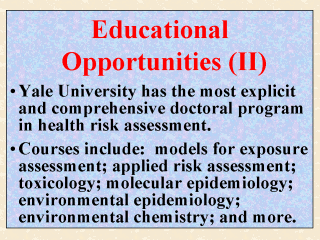| front |1 |2 |3 |4 |5 |6 |7 |8 |9 |10 |11 |12 |13 |14 |15 |16 |17 |18 |19 |20 |21 |review |
 |
In terms of the
more general area health risk assessment (RA), the School of Public Health at Yale
University perhaps offers the most comprehensive and explicit doctoral program. Even at
the masters degree level, Yale students in the Environmental Health Sciences (EHS)
Division with a focus on risk assessment are required to take a course in Environmental
Epidemiology and a course in Applied Risk Assessment I, plus four related EHS core courses
(Introduction to Toxicology; Environmental Chemistry; Physiology for EHS; and Assessing
Exposures to Environmental Stressors). At the Yale University, the doctoral students in EHS are especially "trained to identify potentially adverse environmental agents, assess their exposures, determine their impact on health, and estimate the consequent risk." Courses offered at the EHS include: Environmental Epidemiology; Environmental Toxicology; Fundamentals of Environmental and Health Risk Assessment; Applied Risk Assessments I and II; Environmental Chemistry; Principles of Epidemiology II; Models for Assessing Exposure to Environmental Contaminants; Environmental Measurement; Occupational Epidemiology; Introduction to Laboratory Techniques in Molecular Epidemiology; Risk Communication; and more. Those doctoral and masters degree students in EHS with a minor or an interest in environmental health policy may elect such courses as Science and Politics of Environmental Regulation, and Environmental Protection Clinic, both of which are offered at the Yale School of Forestry and Environmental Sciences. |